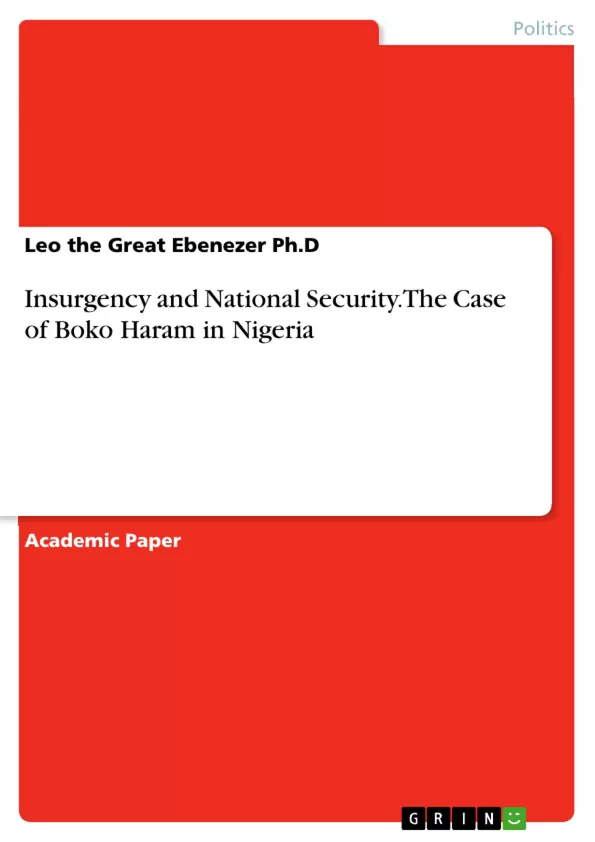This research examines the impact of Boko Haram insurgency on Nigeria’s national security. The objectives were to determine the nature of Boko Haram insurgency on Nigeria’s security, examine the impact of the Boko Haram insurgency on the national security challenges confronting Nigeria, and determine the cost of tackling insurgency by the federal government of Nigeria.
The resurgence of the Boko Haram attacks before, during and after the 2019 general elections showed that the Boko Haram insurgency has not been "technically defeated" as claimed by the federal government of Nigeria. As at May 31, 2019 when this work was concluded, the daily update from the Nigeria’s Security Tracker (NST) of the Council of Foreign Relations (CFR) showed that more than 200 Nigerian and Multinational Joint Taskforce (MJTF), comprising Nigeria, Chad, Niger and Cameroonian troops, Civilian Joint Taskforce (CJTF), insurgents and civilians were killed in just May, 2019 (May 10 – May 31, 2019). These deaths were possible through suicide missions, guerilla attacks, bombings, communities’ massacre, gun battles, ambush, sporadic shooting, kidnappings etc.
From 2011 to 2018, Boko Haram insurgents carried out over 3,346 incidents (attacks). This research observed that trillions of naira has been spent in the fight against insurgency by the military as released by the federal government and donor agencies. Countries with strategic economic, political and social interests in Nigeria have also supported financially. However, lack of transparency and accountability on the part of the military, abuse of human rights and lack of transformative approach in tackling the Boko Haram insurgency have undermined the general support (especially morally) needed to ensure that Boko Haram insurgency does not pose any security threats to the sovereignty and territorial integrity of the Nigerian state.
Inhaltsverzeichnis (Table of Contents)
- CHAPTER ONE
- INTRODUCTION
- Background to the Study
- Statement of Problem
- Research Objectives
- Research Questions
- Significance of the Study
- CHAPTER TWO
- LITERATURE REVIEW AND METHODOLOGY
- Literature Review
- Theoretical Framework
- Methodology
- CHAPTER THREE
- DATA PRESENTATION AND ANALYSIS
- Data Presentation
- Discussions of Findings
- CHAPTER FOUR
- CONCLUSION AND RECOMMENDATIONS
- Conclusion
- Recommendations
Zielsetzung und Themenschwerpunkte (Objectives and Key Themes)
This research examines the impact of Boko Haram insurgency on Nigeria's national security. It aims to determine the nature of Boko Haram insurgency on Nigeria's security, examine its impact on national security challenges, and assess the cost of tackling the insurgency by the federal government of Nigeria.
- The impact of Boko Haram insurgency on Nigeria's national security
- The nature of Boko Haram insurgency and its influence on security challenges
- The cost of tackling Boko Haram insurgency for the Nigerian government
- The role of international support and its limitations in combating Boko Haram
- Recommendations for addressing the insurgency and promoting sustainable peace
Zusammenfassung der Kapitel (Chapter Summaries)
Chapter One: Introduction This chapter provides background information on the Boko Haram insurgency, its historical context, and its devastating impact on Nigeria. It highlights the insurgency's escalation and the increasing number of incidents, deaths, and displacements. The chapter also outlines the research objectives, questions, and significance of the study.
Chapter Two: Literature Review and Methodology This chapter explores existing literature on insurgency and national security, focusing specifically on the case of Boko Haram. It examines relevant theories, such as the Anomie Theory and the Relative Deprivation Theory, and discusses the research methodology employed. The chapter also provides details on the data collection and analysis methods used.
Chapter Three: Data Presentation and Analysis This chapter presents the data collected and analyzes it through a comprehensive review of relevant literature. It explores the statistical data on incidents, casualties, and economic impacts of Boko Haram insurgency. The chapter also analyzes the factors contributing to the insurgency's resurgence and the effectiveness of counter-insurgency strategies.
Schlüsselwörter (Keywords)
This research focuses on the impact of Boko Haram insurgency on Nigeria's national security, examining the nature, consequences, and costs of the insurgency. Key terms include Boko Haram, insurgency, national security, Nigeria, terrorism, counter-insurgency, military response, international support, and sustainable peace. Additionally, the study employs theoretical frameworks such as the Anomie Theory and the Relative Deprivation Theory to analyze the insurgency.
- Citar trabajo
- Leo the Great Ebenezer Ph.D (Autor), 2021, Insurgency and National Security. The Case of Boko Haram in Nigeria, Múnich, GRIN Verlag, https://www.grin.com/document/1119010



